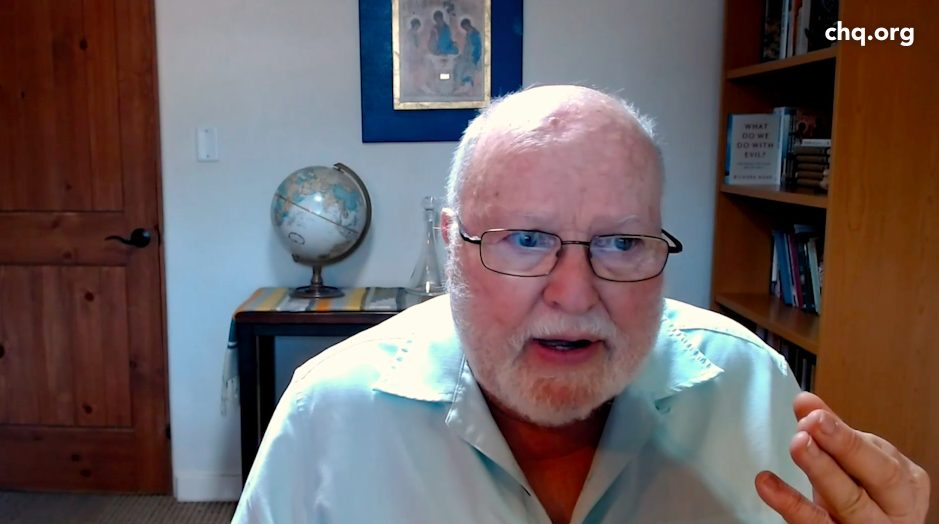
People sin at an unconscious level, said Fr. Richard Rohr, similar to Buddhism’s concept of delusion. The way that Christianity has centered sin on the flesh is a distraction from identifying these delusions in the dominant understanding.
Rohr gave his lecture on evil in the flesh at 2 p.m. EDT on Wednesday, Aug. 19 — the third in Chautauqua’s Week Eight Interfaith Lecture Series theme of “Reframing Our Journey: A Week with Fr. Richard Rohr, OFM.” First, he said that the writings of Saint Paul have led to immense misunderstandings because of the Greek word “sarx” being mistranslated to “flesh” in Saint Paul’s description of the dichotomy between flesh and spirit.
“We still think of flesh and spirit not just as enemies, but as warring against another,” Rohr said.
Rohr said that “sarx” is better understood as “ego,” a small, self-enclosed, narcissistic, self-protective self that is not maliciously evil, but tricky and untrustworthy.
“If you don’t recognize it, you will be trapped by it,” Rohr said.
As for any organization of people, Rohr said companies are inherently self-protective. They have to protect employees, to a degree, and ensure a future for the company. But they participate and benefit from the systems that people do not often see as inherently malicious, like the military-industrial complex.
Rohr said that religions’ failure now and throughout history is that they have stalled the collective ability to focus on true evil by convincing people that minor sins they commit are the root of all evil. He compared religious institutions to vacuum salesmen who conned people by sprinkling dust on their doors before knocking.
The first thing evil does, Rohr said, is disguise itself as necessary or strategic for the common good of a group.
“The only way we can really attack evil,” Rohr said, “is to see it as it is.”
Jesus also pointed out evil not in individuals, but in entire towns and communities: Jerusalem, Capernaum, the Pharisees.
Jesus called for evil to be named correctly against the wishes of kings and priests misusing power, and Rohr said that currently, journalists have the most freedom in history to broadly cover true evil against the wishes of those in power.
But people panic, Rohr said, when evil is pointed out at an institutional level like the military-industrial complex.
“I’m not talking about an individual soldier, I’m not talking about an individual health care worker, I’m not talking about an individual banker,” Rohr said. “But I am saying the system of health care, the system of banking, the penal system of incarcerating people, is almost always not so good.”
On page 13 of his book, What Do We Do With Evil?: The World, The Flesh, and the Devil, he said that the spiritual journey should focus on expanding people’s freedom to do good, rather than blaming someone who has committed evil.
“That paralyzes a person even deeper in the flesh,” Rohr said. “It doesn’t liberate them from the flesh.”
While Rohr sees this in the teachings of Jesus and Paul, he doesn’t see it necessarily reflected in Christianity.
“Our notion of religion has been a set of requirements, and clergy were made into policemen — and they were men in almost all of history. Our job was to enforce the requirements, not to entice into liberation,” Rohr said. “In fact, (liberation) is mistrusted. You’re called dangerous or a heretic if you offer people new levels of freedom, because they might make mistakes.”
But mistakes based in the flesh can also bring people closer to God. Rohr said that he believes religions are stuck in a state of unconsciousness, in the first stage of development as defined by Ken Wilbur. Part of that unconsciousness is denying that a person benefits from systems of evil.
“I have enjoyed the fruits of evil,” Rohr said. “The military-industrial complex has kept me free my whole life.”
The understanding of sin that Rohr found in the Book of Paul is that sin is unconscious. Paul’s intuition in his writings was built on Jesus, Rohr said, even though Paul never knew Jesus, and the four gospels placed in front of his in the Bible had not yet been written. Rohr said this is because Paul was dealing in basic truths that came from what Rohr calls a Universal Christ. Rohr has written about this concept in a separate book called The Universal Christ: How a Forgotten Reality Can Change Everything We See, Hope For, and Believe.
“To think that we can totally resist and avoid all evil is only to persist in it in a new form,” Rohr wrote.
Operating unconsciously comes from the lowest part of the brain stem, the section that controls the fight-or-flight-response. In the Old Testament, the Bible’s protagonists react with a fight response, convinced that they can eliminate evil by exposing and killing it. But Rohr sees the flight response engaged in today’s brand of unconsciousness —people deny where true evil exists.

Reflecting on Catholic art in his last trip to Europe, Rohr observed that the archangel Michael is depicted front and center in churches and cathedrals with a sword, slaying the dragon of evil. But a friend brought him to a side altar of a church in Nuremberg, Germany, to show him Saint Martha petting the dragon and smiling.
“Whatever we call evil, it’s something we have to deal with, learn from, integrate … not eliminate,” Rohr said.
Jesus did also teach this feminine side of spirituality, Rohr said, but it is not what Christianity as an institution has historically valued. The way out of true evil is found in this path Jesus took, through nonviolent resistance against a system’s lies. But this isn’t easy, Rohr said, since the majority, the crowd, can never see past the illusion of evil.
The style of vengeful justice as portrayed by the archangel Michael is often misplaced when directed at the flesh, which most world languages don’t connote as the ego, or hidden internal badness, and instead define it too literally as sex.
“Religion after religion has localized the heart of evil in sex,” Rohr said.
For evil in the flesh specifically, Rohr said that the death of the ego is where the Saint Martha-like treatment of evil happens. Rohr said this can be done over time through prayer and contemplation in order to kill the ego that each human clings to.
“We gave the false impression that Christianity is not about dying, but it is,” Rohr said.
At 2 p.m. on Thursday, Aug. 20, Rohr will explain the devil as a source of evil — evil in its most mysterious form.
This program is made possible by the Eileen and Warren Martin Lectureship for Emerging Studies in Bible and Theology & The Strnad Family Fund.




